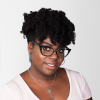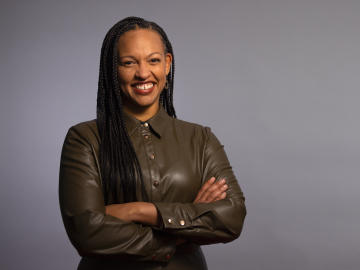I Didn’t See Anyone Like Me
I was a tad younger than I am now, was living in Texas, was a wife and mother to pre-school and elementary school daughters, was getting a masters part time in software engineering, and I got laid off from my day job. So I started looking for PhD programs. I figured I had the time. And when I scrolled through programs online, the people who wrote the papers I liked were in computer science departments. So I reached out and called one of the professors who caught my eye at Virginia Tech. We talked about the stuff you’d expect—what she was doing, why I was interested. And then the conversation got weird.
“Do you know where Virginia Tech is?” she asked me.
I was both offended and confused by the question. Obviously, I knew where it was. I mean, the school is called Virginia Tech. I wasn’t sure if she assumed I hadn’t done my research or if I was missing something.
“Yes, it’s in Blacksburg, Virginia,” I replied.
The conversation moved on. But somehow it didn’t, because we got right back there again.
“Do you know where Virginia Tech is?”
The emphasis was a little bit different the second time, as though she meant something different than what the words were. There was subtext there. I was missing it.
“Let me give you Jamika’s number. I think it’ll be good for you to meet her.”
And that was it. After I talked with Jamika, I got it.
My reality, a Black mom of two Black daughters with a Black husband … in Blacksburg, Virginia would be tough. Not just because of any one thing—like finding a hairdresser or a church—but because just existing in that space as Black people would be tough. And that’s tough on top of earning a PhD in computer science.
There I was, wanting to talk to the professor about research while she wanted to talk to me about the map. In hindsight, she was looking out for me—and the best thing she could do was not talk to me, and instead send me to someone who could say the things she couldn’t. Needless to say, I didn’t go to Virginia Tech. I didn’t even apply.
Instead, I went to Drexel University in Philadelphia, and when I got there, I wasn’t thinking deeply about race or gender as they relate to computer science. It had been nearly a decade since I was in school, and I needed to remember what it was like to be a student. But I had two young daughters and was helping them navigate school, too. I was so focused on the details of making life work that I didn’t even think about being the only Black woman.
So, while my kids were learning their vocabulary words, I was learning my own, because the language of academia was new to me. At home I was quizzing my daughters … “Don’t put their toys over there”—two different “theres” that sound the same and have different meanings. And I was also learning … “Will my department fund me to attend a conference?” is a very different question from, “will my department let me go to the conference?” At face value they may seem like the same question, but like “there” and “their”—they are different and mean very different things, as I came to learn.
Because the answer was yes: my department would fund me to go to the conferences. And I mean all the conferences. I went to the computing conferences, the gender conferences, the diversity conferences. But no matter where I went, I didn’t see anyone like me on the stages, at the session talks, at the award ceremonies.
And that’s why the group of women I’d come to know—including Jamika—would meet after the meeting, finding each other at these conferences and eventually establishing a conference of our own. During our first meeting at our blackcomputeHER conference seven years ago, we spoke about the importance of addressing issues that mattered to “people who look like us.”
At one point, someone raised their hand and asked, “by ‘us,’ do you mean Black women? You do know it’s okay to say, Black women, right?”
We were so used to hearing blanket phrases about our identity that we unknowingly hid under one ourselves. By adopting the language of academia, we were alienating ourselves … from ourselves. The language that I had become so used to using, and actually hated, flowed so freely from my mouth and was doing harm.
What I do now is informed by personal experience. When I think about policy, my focus includes creating equitable systems that recognize intersectional identities—the multiple dimensions that make up who we are. If we design for that, hopefully more people will get more of what they need out of the main meeting. You know, like this AAAS meeting. But also, the meeting with a prospective advisor. Or the meeting with your department, or your research lab, or your colleagues. It’s everyone’s responsibility to change the systems, so that no matter who walks into what room, they can get what they need.
Quincy Brown, PhD, director of Space STEM & Workforce Policy, Office of the Vice President at the White House.
She shared this story at the “Living Science: A Story Slam" during the 2023 American Association for the Advancement of Science conference. The event was hosted by Jonathan Adler and Gillian Epstein, cofounders of The Story Lab at the Olin College of Engineering.
Read more “Living Science” stories here.
Join the 50,000+ subscribers in 170+ countries who rely on Global Health NOW summaries and exclusive articles for the latest public health news. Sign up for our free weekday newsletter, and please share the link with friends and colleagues.





